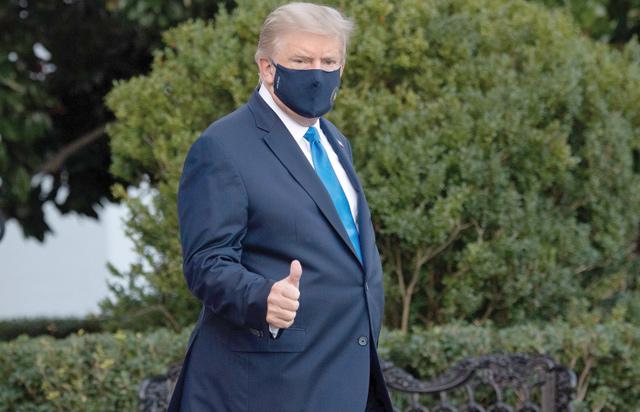- International News
- Sun-2020-10-04 | 03:55 pm

Nayrouz News Agency :
President Donald Trump remained hospitalised Saturday for an experimental COVID-19 treatment, but said he was "well", following bombshell news that he had contracted the virus, knocking him off the campaign trail a month from the US election.
After having not been seen in public since the shock announcement, the president walked out of the White House Friday evening wearing a mask and flew by helicopter to the Walter Reed military hospital outside Washington.
In an 18-second video recorded inside the White House and released on Twitter, Trump broke his silence, saying he was being hospitalised but "I think I'm doing very well".
"We're going to make sure that things work out," he said, adding that First Lady Melania Trump — who also contracted the virus — was "doing very well."
Press Secretary Kayleigh McEnany said Trump was receiving the anti-viral drug remdesivir following consultation with specialists. The president was "not requiring any supplemental oxygen", she said in a statement late Friday.
Earlier, she said that medical experts recommended Trump work from presidential offices at Walter Reed "for the next few days".
The hospitalisation indicated an intense effort to make sure the president’s reportedly "mild” symptoms do not worsen.
The development also highlighted the uncharted waters for the US election on November 3, with Trump — who is well behind his Democratic opponent Joe Biden in the polls — having to freeze much of his campaign.
At first, aides gave rosy assessments, with Trump’s chief of staff saying the president, 74, had only mild symptoms, was in "good spirits” and feeling "very energetic”.
But later on Friday White House physician Sean Conley said Trump received a single dose of Regeneron’s antibody cocktail, a treatment not yet approved by regulators.
"He’s being evaluated by a team of experts, and together we’ll be making recommendations to the President and First Lady in regards to next best steps,” Conley wrote.
The president’s son Donald Trump Jr told Fox News his father was "obviously taking it very seriously, but he’s a fighter”.
Biden out on his own
Trump’s illness upended the White House race, with Biden suddenly finding himself alone on the campaign trail — and able to argue that his more cautious approach to COVID-19 had been vindicated.
Biden has made Trump’s frequent downplaying of the pandemic and mixed messaging on mask-wearing a central campaign theme, while Trump has tried to shift the narrative to areas where he feels stronger, like the economy.
The former vice president, who stood on a stage with Trump for 90 minutes during their ill-tempered first debate Tuesday, announced that he and his wife Jill tested negative Friday.
Underlining his sudden advantage in the bitter race, Biden, 77, travelled to Grand Rapids, Michigan, going ahead with a previously scheduled campaign stop.
Biden said he was praying for Trump and his family, and his campaign announced it would take down all negative ads.
However, Biden also reminded voters that he has pushed consistently for taking seriously the coronavirus, which has killed more than 208,000 Americans, unlike his opponent who has mocked the Democrat for his rigorous use of masks.
"Be patriotic,” Biden told supporters in Michigan through a blue surgical mask. "It’s not about being a tough guy. It’s about doing your part.”
Campaign grounded
Trump’s shock diagnosis was a huge blow to his reelection effort, triggering a freeze on plans to barnstorm the country in an attempt to catch up in the polls.
The Trump campaign said all planned events involving the president were either being postponed or going virtual — starting with the cancellation of a Florida rally Friday, one Saturday in Wisconsin and others in western states like Arizona next week.
Even the second Trump-Biden debate, scheduled for October 15, is now in some doubt.
Rallies are such a key part of the Trump brand that his sudden inability to travel leaves the campaign scrambling to reinvent its strategy. In addition, Trump has made his argument that coronavirus dangers are overblown a central plank of his reelection platform.
Contact tracing
News of Trump’s infection came after one of his closest advisors, Hope Hicks, tested positive — sparking fears of a cluster of cases emanating from the heart of the White House.
Trump met with dozens of people through the week and reportedly went to a fundraiser in New Jersey after it was known that Hicks had contracted the virus.
The White House said it was carrying out contact tracing, while Melania Trump’s spokeswoman said the couple’s 14-year-old son Barron had tested negative.
Vice President Mike Pence and other senior figures tested negative. The White House said Supreme Court nominee Amy Coney Barrett was negative too.
Former White House top aid Kellyanne Conway, however, announced late Friday she had tested positive with "mild” symptoms.
Trump’s campaign manager, 42-year-old Bill Stepien, said he had tested positive, US media reported, and was in quarantine with mild symptoms.
In his 70s and technically obese, the president is in a higher-risk category.
Daniel Griffin, an infectious disease specialist, told AFP Trump had an estimated 20 per cent chance of developing severe disease requiring oxygenation.
As the news rattled global stock markets, leaders including Germany’s Angela Merkel, Britain’s Boris Johnson, and Russia’s Vladimir Putin all wished the president and first lady a swift return to health.
On Saturday Chinese leader Xi Jinping said he was wishing for the president’s "speedy recovery”, state media reported.
Trump’s predecessor Barack Obama noted the US is "in the midst of a big political fight” but set aside the bitter election battle to extend "best wishes” to the first family.













